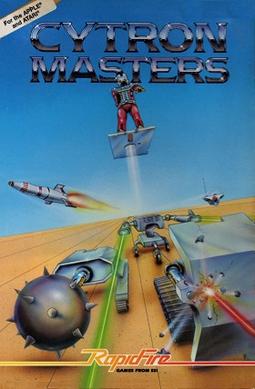
- And we are here to witness what might be the most important CYTRON battle of our generation. The stakes are high, dear viewers. Very high. On your left, the CYTRON Grand Master Zorblax representing Planet Pupulon. And on your right, the newly inducted CYTRON Master [checks notes] Narwhal…
- Wait, I am a what now?
- … who will represent planet Earth…
- Good old Earth. At least I know what that is !
- … should he lose, Earth will be detonated !
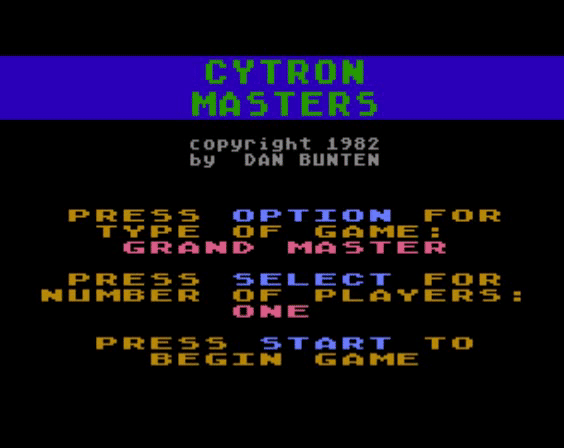
But first, a small reminder on the rules of the CYTRON battles, the most sacred of our ritual combats. Each CYTRON Master must destroy the opposing CYTRON Master’s command center, on the other side of the arena. This is only possible by using a CYTRON mine, which of course first requires clearing the way by CYTRON shooters, themselves protected by CYTRON bunkers.
Each CYTRON Master can summon CYTRONS (or CYbernetic elecTRONic deviceS) as they please, provided they have enough energy to do so. Energy, of course, is produced by the eight power centers.
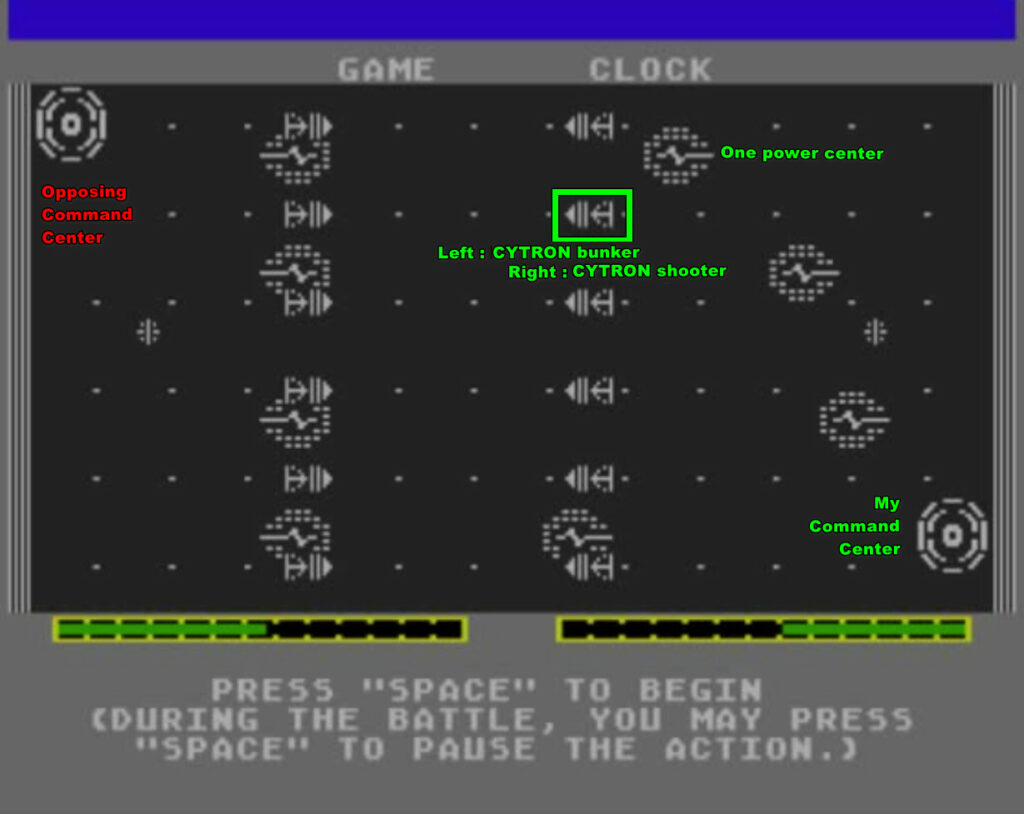
BUT ALREADY, dear viewers, the battle has started. Master Narwhal has deployed some CYTRONS at the bottom of the arena, where his most vulnerable power center is.
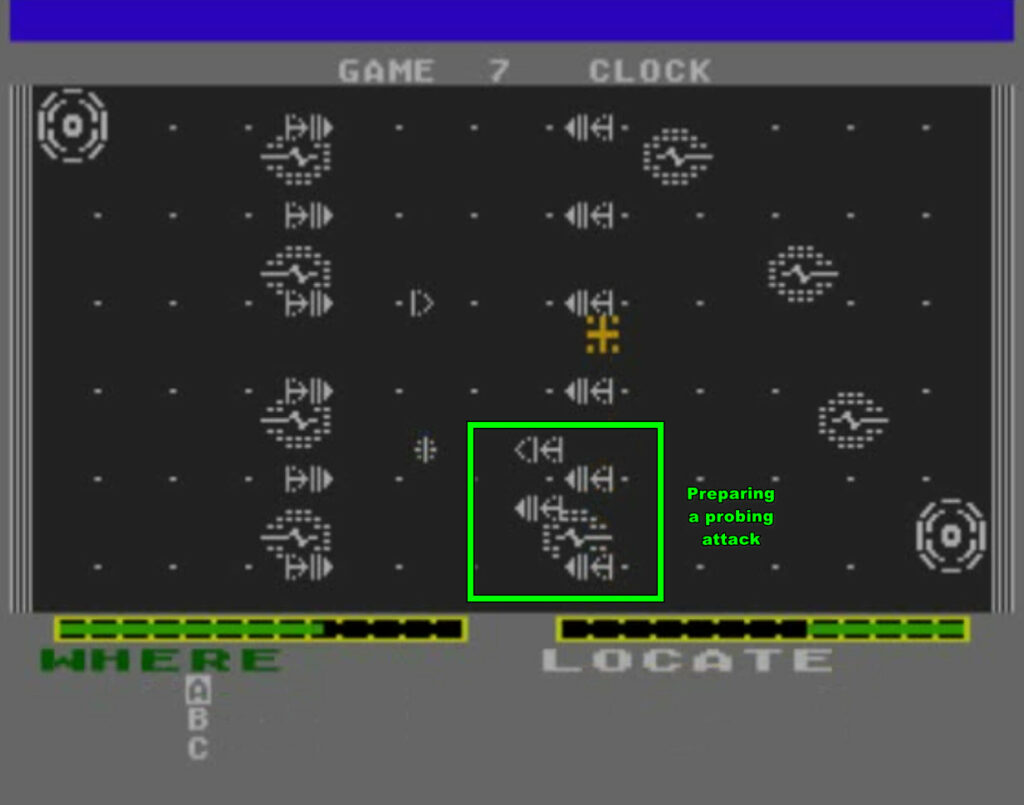
Of course, Master Narwhal cannot attack with too many units at the same time, as Grand Master Zorblax will immediately punish him with a missile attack.
But what is this ? Yes ! Grand Master Zorblax is preparing to counter-attack Master Narwhal’s probing attack. What a BOLD move ! You can see Grand Master Zorblax building up assault columns of CYTRON shooters, protected by CYTRON bunkers at the front of the columns !
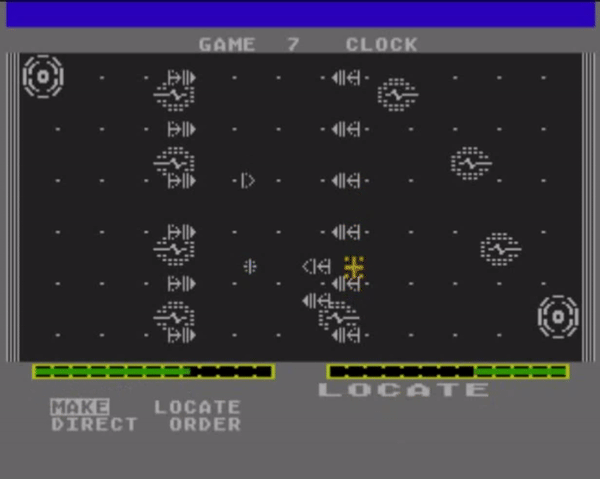
But Master Narwhal immediately counters the counter-attack with a missile. The spectators are going WILD !
Grand Master Zorblax sends an anti-missile immediately, but it fails to intercept Master Narwhal’s missile, which destroys two CYTRON shooters.

Some of Grand Master Zorblax’s Cytrons are still advancing, but what is Master Narwhal doing … building a CYTRON Commander !
With a CYTRON commander, he can now give, at the same time, an order to all the CYTRONS three spaces away with only one tap. He uses this to order a general fallback, not letting any of Zorblax’s mines get close.
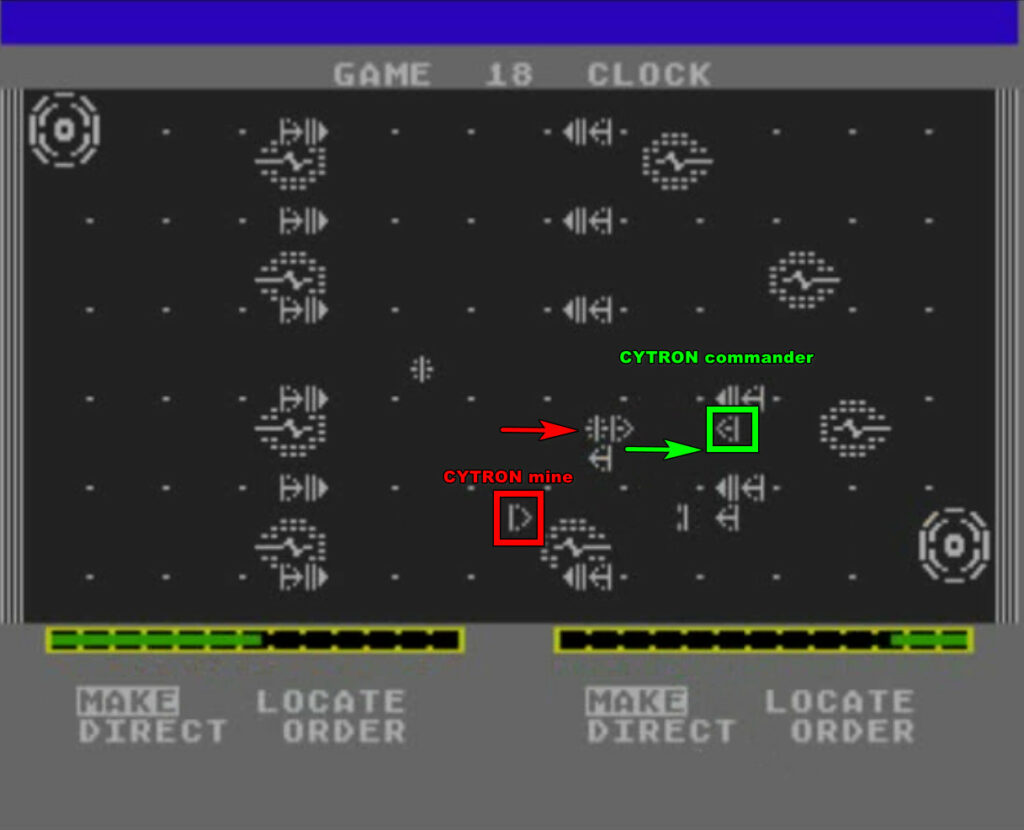
Having won this first engagement, Master Narwhal now advances. But Grand Master Zorblax still has a large energy reserve and attacks in the middle with two columns :

The situation is confusing. One of Grand Master Zorblax’s columns has been destroyed, but the other pierced Master Narwhal’s defence. Meanwhile, at the bottom of the arena, Master Narwhal managed to push some of his own CYTRONS almost to his opponent power centers, though a missile destroyed a fair number of them and now he does not have enough to actually capture a power center.
Master Narwhal is building more CYTRONS at the bottom of the arena, and they are now also moving forward !
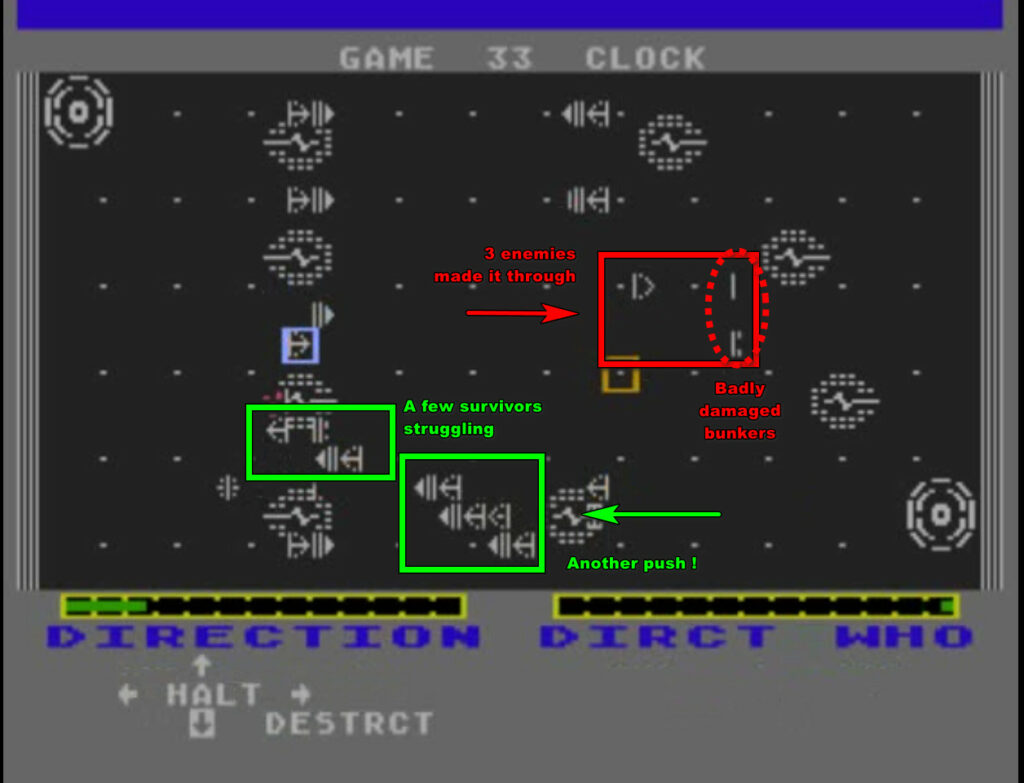
… and Master Narwhal takes a decisive advantage, taking control of one of Grand Master Zorblax’s power centers while defending his own !
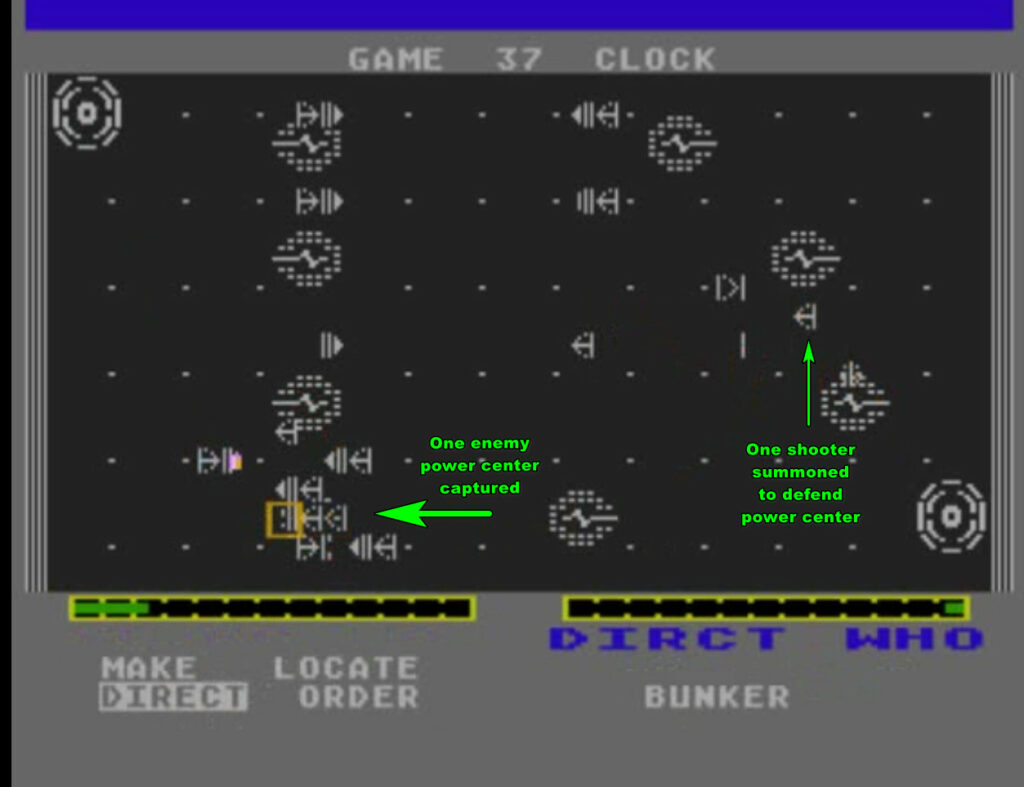
AND A SECOND POWER CENTER IS CAPTURED DESPITE GRAND MASTER ZORBLAX’S MISSILE. WHAT A COME-BACK, FOLKS !
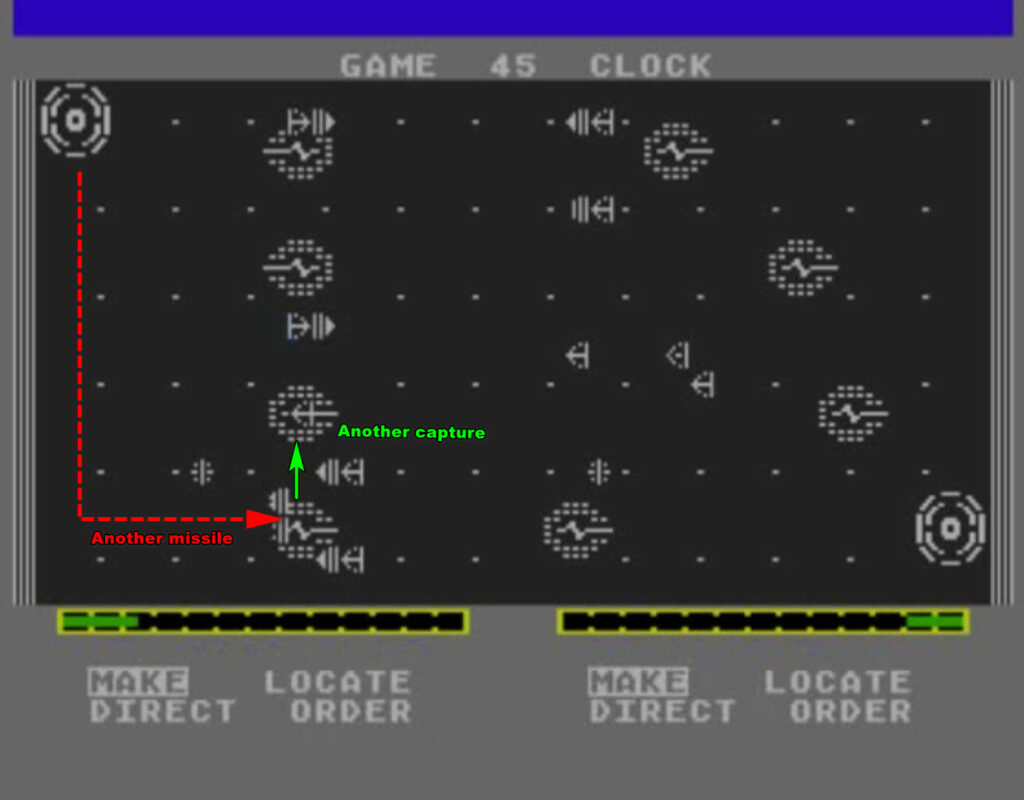
This is the decisive moment. Grand Master Zorblax and Master Narwhal are both rushing reinforcements to the lower-left quadrant of the arena !
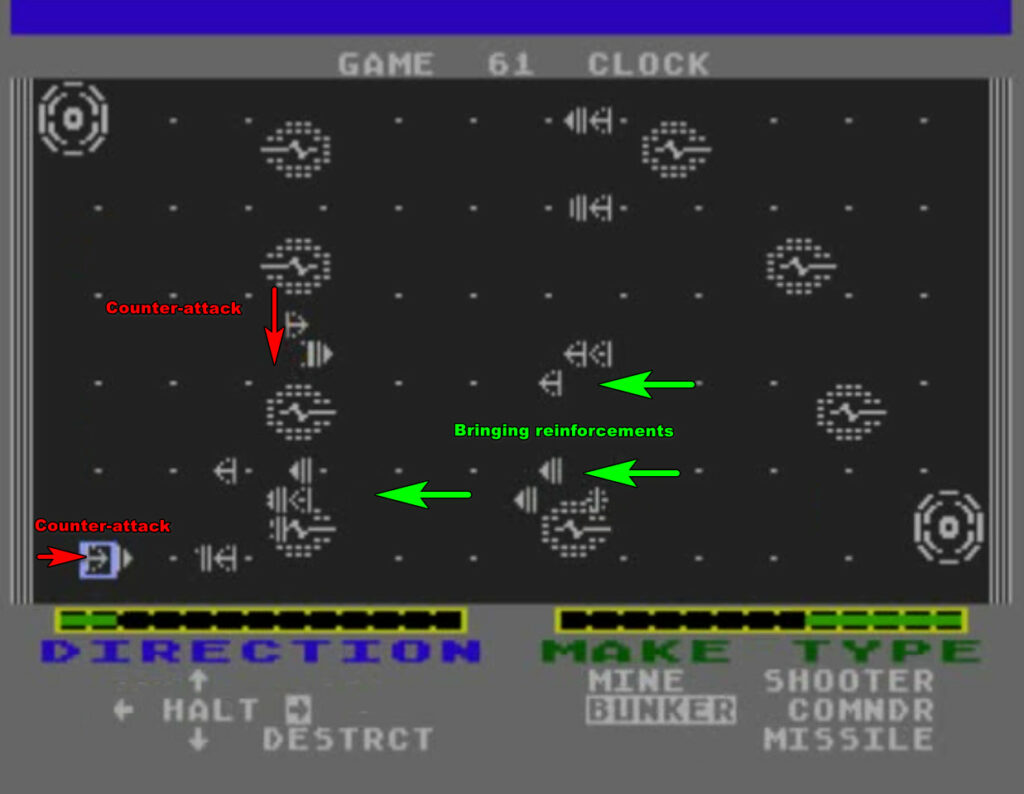
The battle is fierce, for a short moment, the two disputed power centers fall back in Grand Master Zorblax’s control !

But Master Narwhal has more energy in his reserve, and consequently, more CYTRONS . He takes control of the power centers again, and now Grand Master Zorblax is all out of reserve. The remaining two power centers are quickly captured !
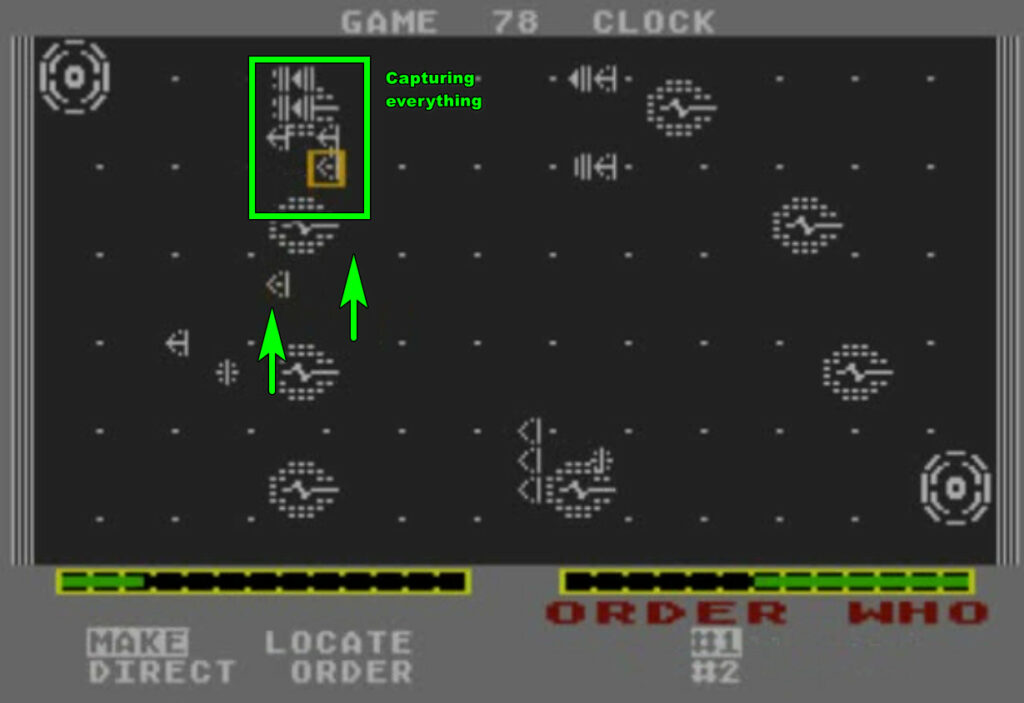
It is the end for Grand Master Zorblax. Master Narwhal needs only a CYTRON mine to finish the job.
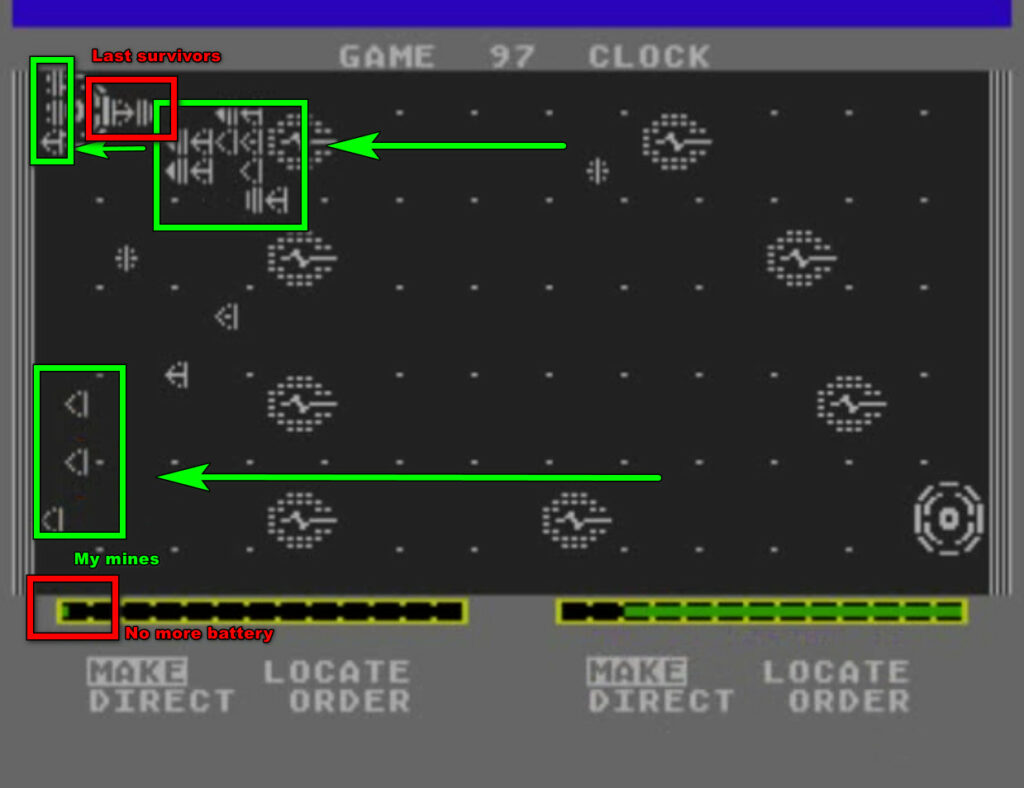
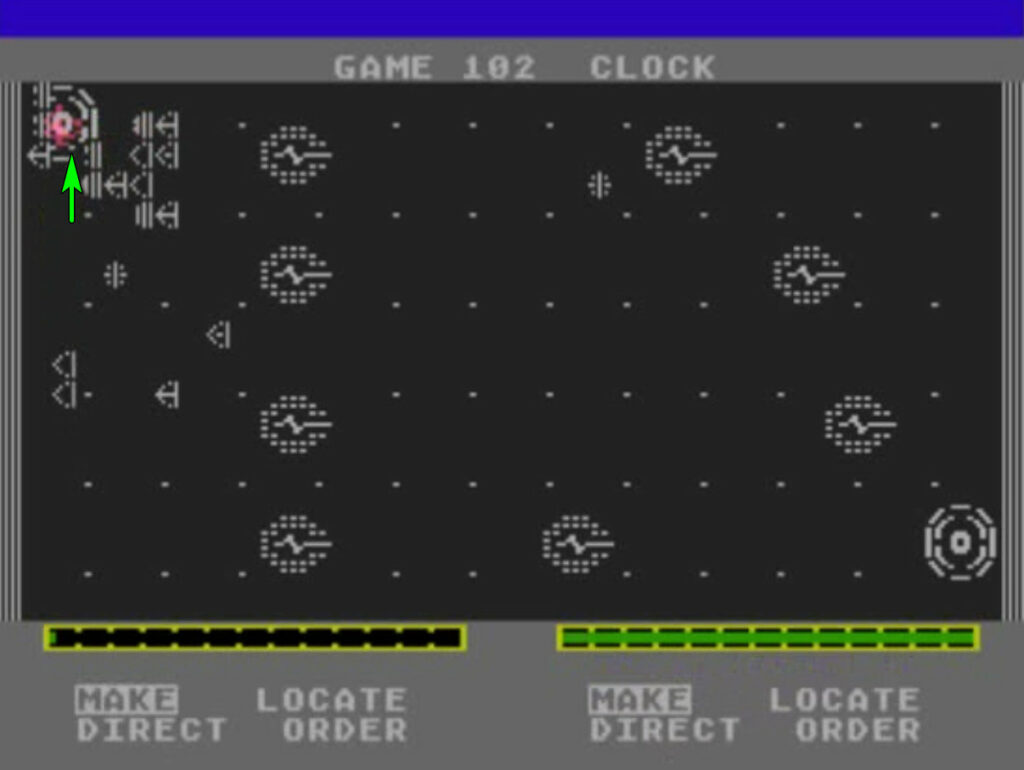
And that’s a victory for the now GRAND Master Narwhal :
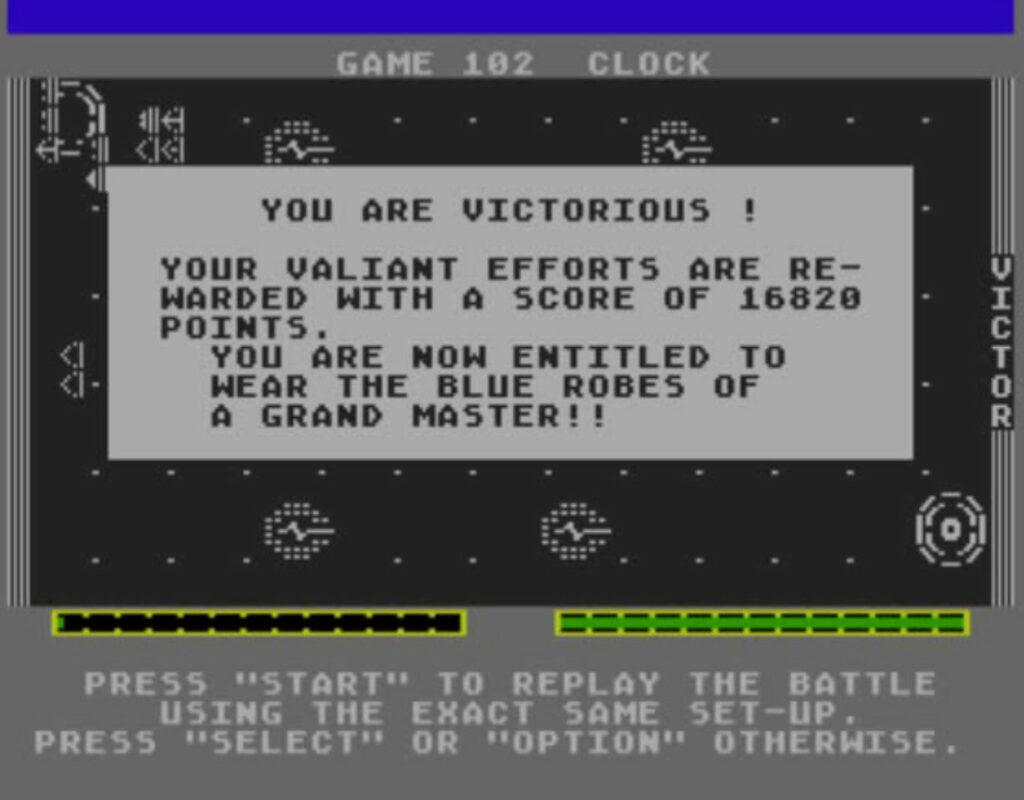
Guess that’s the end for Grand Master Zorblax! Our correspondents on the ground are reporting that the Terrans are already on their way to occupy Zorblax’s home planet Pupulon! Well, win some, lose some, I guess! Tune in again next week, folks, for an exciting new battle with large-scale geopolitical outcomes!
Rating and Reviews
Cytron Masters by Dan Bunten (later Danielle Bunten Berry), and published by SSI, USA
First release : Apple II in June 1982
Tested on : Atari Emulator, Apple II emulator
Total Hours Tested : 3 hours
Average duration of a battle : 15 minutes
Complexity : Average (1/5)
Would recommend to a modern player : No
Would recommend to a designer : No
Final Rating: Well-designed, but obsolete
This is my first coverage of Dan Bunten (later Danielle Bunten Berry) on this blog, but by 1982 Bunten was certainly not new to gaming nor to SSI. Once again, the Digital Antiquarian has a better coverage of Bunten’s “early” career than I could ever have ; suffice to say Computer Quarterback was the first external game published by SSI – and its second-most successful game at this point after Computer Baseball (it sold 31 000 copies in its lifetime, in addition to the data disks released almost yearly). Computer Quarterback remained in the catalogue until Summer 1988 – longer than any other SSI game released in 1980, 1981 or 1982. Bunten had also released the less popular Cartels & Cutthroat$ in 1981 (which was covered by the Data Driven Gamer here).
CYTRON Masters belongs to the prestigious category of “RTS precursors“, and more than a precursor it may be the first full-fledged “pure RTS”. The earlier ones were either :
- mixed real-time / turn-based,
- Utopia (1981), not covered here so far as it is multiplayer only,
- the strange BEZ-MX (1981), not covered yet by lack of manual, but it will happen eventually,
- or purely tactical,
- Legionnaire (1979/1982 – the initial Commodore PET version of 1979 is lost),
- Centurion (1981), a copy of Legionnaire,
Some people also put War of Nerves! (1979) in this “precursor” category but no. Seriously, no.
Joel Billings did not have much personal interest in the non-historical CYTRON Masters, but he had loved Computer Quarterback and liked Cartels & Cutthroat$. Billings also found the idea of a real-time wargame “intriguing and unique“, and finally such a fast game fit well with the new line of products he wanted to launch : RapidFire.
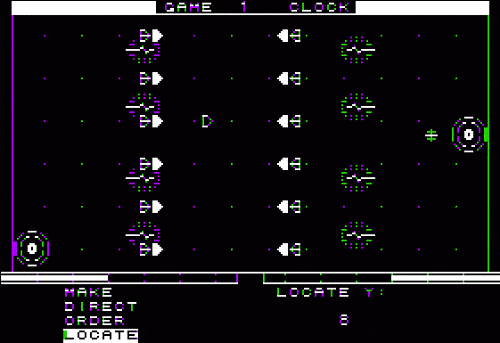
RapidFire had been the name SSI had given to the turn management system of Shattered Alliance ; it became a line of products that were all about “fast play” and “excitement“, at least compared to the usually slow SSI wargames. The two first RapidFire games were Cytron Masters and Galactic Gladiators, later in 1982 they were joined by the Cosmic Balance and S.E.U.I.S. The Warp Factor was also retrofitted as RapidFire for a short while (possibly as a design prequel to the Cosmic Balance), but in late 1982 already it rolled back to the SlowFire category. Oddly, the Shattered Alliance never belonged to that prestigious group.
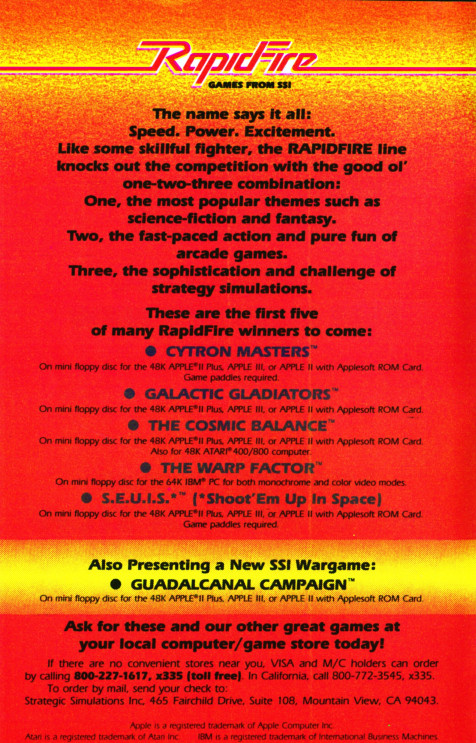
The first version of CYTRON Masters was on Apple II, but the game was ported on Atari 8-bits in late 1982/early 1983. As the Digital Antiquarian states, this port was a revelation for Bunten, who found the platform better for his kind of games. A “special note to Atari owners” added to the Atari box of CYTRON Masters explained how the Atari version was just flat-out better than the Apple II one, in particular thanks to the superiority of Atari’s joysticks compared to Apple’s paddles, and concluded by :

And indeed, the game Bunten would be the most famous for, M.U.L.E., was developed natively for Atari and never received an Apple port.
As a final note, Bunten was never interested by single-player games. With the exception of The Seven Cities of Gold and its spiritual sequel Heart of Africa, the focus was on multiplayer first, single-player second, if at all. CYTRON Masters is no exception. I can envision the epic battles I would have had with my brother if CYTRON Masters had been available to us when we were kids – but instead, our rivalry deployed in Star Control and Micro Machine, the two games where I believe we both became pixel-perfect. Nonetheless, I will rate and review CYTRON Masters for its single-player mode.
A. Immersion
The manual is introduced by a short story describing the life of a newly inducted CYTRON Master before its first “real” battle. The CYTRON Master receives a visit from an Emperor (not THE Emperor, apparently the universe in CYTRON Masters is filled with petty Emperors) and his gallery of loony sycophants. There is a lot at stake for the Emperor : if the CYTRON Master loses his battle, the Emperor will lose a planet – because that’s the way territorial disputes are solved in the far future. It is very well-written but it is like context in chess or in Go : forgotten as soon as the match begins. Still, it sets up an atmosphere.
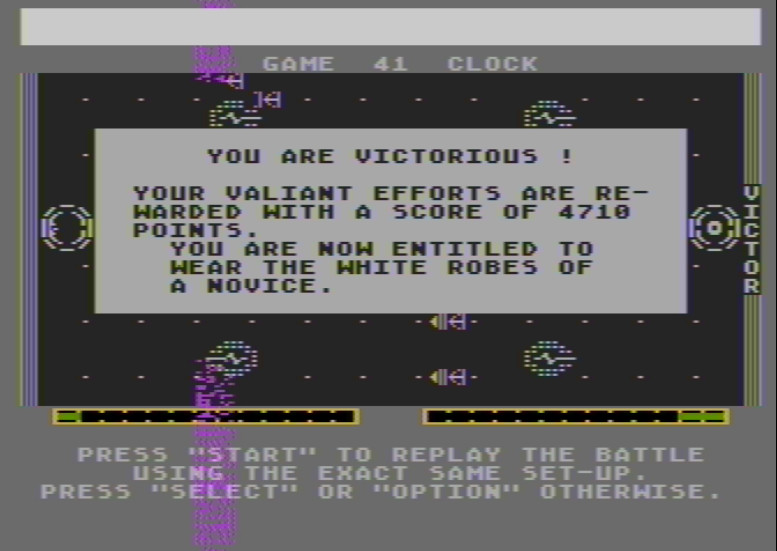
On the Apple II version, the outstanding game tutorial is also introduced by a CYTRON Grand Master, he was fully removed from the Atari version.
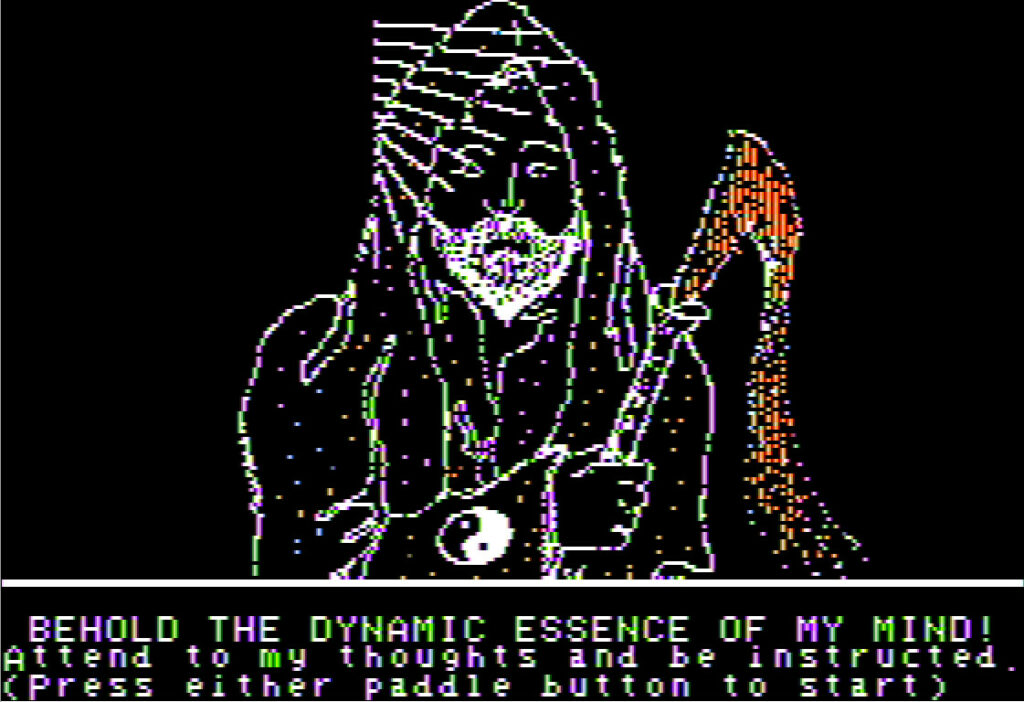
CYTRON Masters was Bunten’s first game with real graphics (Cartels & Cutthroat$ had one screen that was not a wall of text, the earlier games none). Sadly, except for the Apple II tutorial, it is all circles, lines and triangles. It is hard to get excited as the graphics are barely better than ASCII.
Rating : Poor, but an A for effort on the universe and story.
B. UI , Clarity of rules and outcomes
CYTRON Masters is played entirely with the joystick. All information is available on the screen at all times. Orders are given very quickly through a menu, and the player can freely pick any of their units with the pointer. It is hard to do better without a mouse, and these did not start to become standard before the mid-80s.
Interestingly, “control” is part of gameplay. Individually moving units around takes time, as you need to pick them one by one. Moving en force being an important part of tactics, Bunten introduced the commander unit : a fragile and weaponless unit through which “orders” can be conveyed to all units three spaces away from it. To double-down on the commander, Bunten decided that units moved through a commander would move 10 spaces before stopping, whereas units moved individually would only move 5 spaces.

Still, as innovative and “perfect for 1982” as the game’s UI was, it is not a great experience to play today. A match is spent racing across the arena trying to catch units that are moving in all directions and typically overshooting where you want them to be, since any movement order you give moves your CYTRONS by either 5 or 10 spaces exactly. There is a reason why real-time strategy games did not take off before the mouse was commonplace.
The game quickly sinks – for a player my level – into confusion. I don’t like the “click-per-minute” part of RTS, and I suspect that if there was a competitive landscape for CYTRON Masters, the first KPI to rate players would be “orders-per-minute” – this is fun for an arcade game, but there is a reason I am more into wargames.
Rating : Poor
C. Systems
The objective of the game is simple : move one mine to the enemy command center. To clear the way to the mine, the player has several units at their disposal :
- The Mines themselves (cost : 1), which destroy any other CYTRON except bunkers on contact, and have 25% of being destroyed when shot at,
- The Shooters (cost : 4), which shoot at enemy CYTRONS 3 spaces away, have 50% of being destroyed when shot at,
- The Bunkers (cost : 2), which can actually move. They can withstand 10 shots, or 2 mine explosions, or any combination thereof,
- Finally, the Commanders (cost 4), which allow to move other CYTRONS more easily. They have a 75% chance of being destroyed when shot at,
The players can also send missiles (cost 8), which destroy everything within a one-space radius of where they land, but they must avoid the anti-missiles sent by the other player. In practice, given both missiles and anti-missiles take-off from each player’s command centers, missiles are a great defensive tool but they are most probably going to be destroyed by an anti-missile if used to attack the other player’s half of the screen.
All units are created in each player’s one-third of the screen, and if they are created next to an enemy unit they are likely to explode on creation. Except bunkers, CYTRONS don’t have HP : either they are destroyed when hit, or they survive as if they had never been shot at. One refinement though is that CYTRONS that are not moving have 20% less chance of being destroyed – so an immobile shooter has 40% chance of being destroyed when shot at.
Resources are gained through the 8 power centers. Those cannot be destroyed, but they switch sides when occupied by a unit. They generate one-quarter of an energy unit a tick.
And … that’s all.
The game is very simple, but I would not call it deep. There are not so many tactics available, and most of them are basically some variation of “put shooters behind bunkers, then move forward“. There are some decisions to take on where and when to push, and where and when to defend, but most of the challenge is actually micro-managing the CYTRONS in real-time. For instance, quickly moving your shooters from behind one bunker to another as the first bunker is about to be destroyed, maintaining a distance of just 3 between your shooter and an enemy bunker (so shooters behind the bunker cannot retaliate), or regrouping the survivors of an attack to carry on pushing – all of this has more impact on the outcome of a battle than any strategy you may have.
Rating : Poor
D. Scenario design & Balancing
In single-player, there are 3 levels of difficulty :
- In Novice, the AI plays a very weak game. It barely launches anti-missiles and plays slowly, sending isolated CYTRONS.
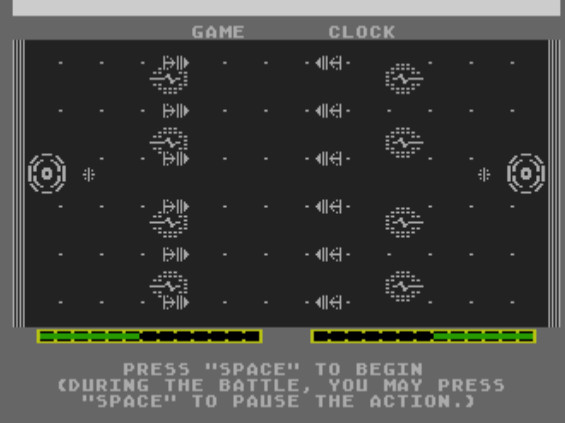
- In Master, the AI launches anti-missiles with some delay and even, rarely, missiles, though the latter tend to miss their targets. The human player’s power centers are more vulnerable, as one or two are quite close to the middle. The AI attacks in single columns.

- In Grand Master, the AI launches an anti-missile immediately after you send a missile, so its half of the board is off-limits. It will also actively counter your pushes with missiles. The AI attacks aggressively with multiple columns, which it can pay with a significant bonus to energy (both starting and production). The placement of Control Centers can be (not always) asymmetric, and your power centers are spread out, at least one of them will be very close to the middle of the arena.

The AI is weak and you will consistently beat the “Grand Master” AI after a couple of hours of training. I appreciate that it plays like a human, which means it needs to pick its units one by one to give them orders, and just like a human it can get discombobulated as it focuses on the wrong part of the arena. See for instance this nice infiltration by the top of the arena (speed 400%)
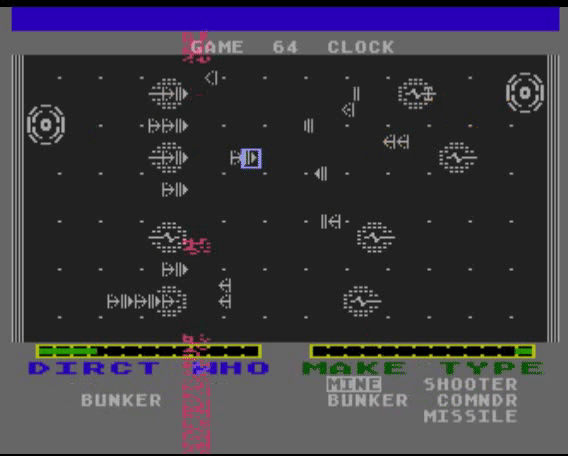
Rating : Very poor
E. Did I make interesting decisions
Yes, mostly on resource allocation and timing of attacks – but the real mastery of the game is on how fast you can order your units around.
F. Final rating
Well-designed, but obsolete. It is just not that fun as a solitaire game. I am pretty sure it would have been exhilarating against my siblings !
Contemporary Reviews
Computer Gaming World reviews CYTRON Masters in September 1982 ecstatically, concluding with “CYTRON Masters is an exciting game offering multiple levels of play with variation to suit the individual”. Of course, it is hard to separate the earnest praise from the commercial interest : the review was written by a playtester. Computer Gaming World does not hide it – it is mentioned in the title of the review, and it is probably for the best because any claim of a neutral review would have been tainted by Computer Gaming World‘s relationship with both Bunten and SSI.
In September 1982, Bunten already had a short but intense history with Computer Gaming World. In May of that year, Bunten had written a long and abrasive letter to Computer Gaming World, complaining about an earlier review of Cartels & Cutthroat$ and lambasting “the lack of standard policy for review” that “destroys [CGW’s] credibility.” Those were sparring words, and while the author proposed “a panel of reviewers”, Computer Gaming World (which to its credit published the letter) offered something else entirely to appease Bunten … the opportunity to write a regular column called “Real World Gaming” in the next issue. Bunten started the column in July, and in the same issue, the most prized ad space – the second page – was fully allocated to CYTRON Masters. So by September 1982, when the time came to review CYTRON Masters, the editors of Computer Gaming World probably decided there was no point trying to pretend to be neutral on the game.
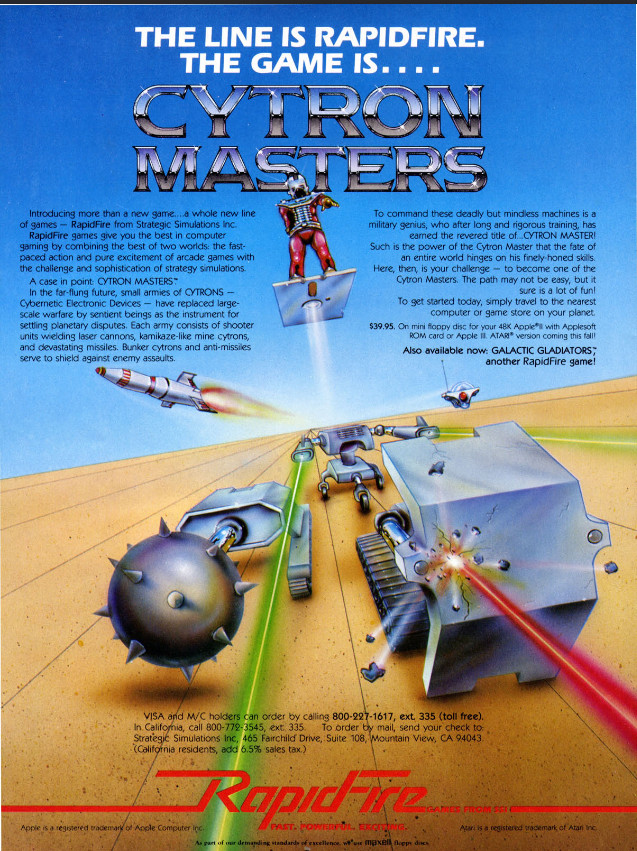
Whether Computer Gaming World was sincere or not, the praise was unanimous. To take only a few examples:
- Softtalk (September 1982) gives it “a high rating in playability, intelligence and excitement”, and insists on how “control processes are the essence of what makes CYTRON Masters unique“,
- The Space Gamer (January 1983) called it “the perfect combination of arcade and board game“, only complaining about the weakness of the AI,
- Incider (August 1983) only complains… that there is no award for best game of the year to give it !
Even the snobby French people from Jeux & Stratégie praise the game in their February 1983 issue. Talking about the new RapidFire liken they allocate 1 column to CYTRON Masters and two lines to Galactic Gladiator ; praising the game, they also call it “unsettling” : “we rarely see all the counters moving at the same time on a boardgame”.
Despite its stellar reputation, CYTRON Masters sold poorly : 4 700 units only. While being a precursor to real-time strategy games with unit buildings and resource management, it had almost no influence on what RTS subsequently became, and I don’t see any modern game that could be compared to CYTRON Masters: to a large extent CYTRON Masters was a design dead-end. Still, it solidified Bunten’s reputation, who one year later became, with M.U.L.E., a designer as famous as Chris Crawford ; M.U.LE. may not be a wargame, but I believe I will have to cover it just the same.